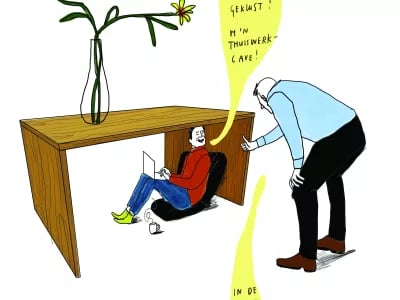The coronavirus pandemic has had an impact on pretty much every business, but the intensity of this impact differs considerably by company. For at least some players the rules of the game appear to have changed dramatically, as demonstrated by this first of a series of dialogues between CEOs of various NPM Capital portfolio companies. Victor Aquina from DeliHome meets Raf Lambrix of Belgian-based BD myShopi. ‘We’ve learnt from this crisis as well.’
Lambrix: ‘Here in the Netherlands, you went into what was called an “intelligent” lockdown. Our own lockdown restrictions here in Belgium were a little more severe — for six weeks, we weren’t allowed to have a single leaflet delivered, and that’s just for starters. How did you guys experience it at the beginning?’
Aquina: ‘We were massively affected when the pandemic first hit back in March and April. We also operate outside the Netherlands, and in Belgium and France all the stores closed. In those countries, we were able to hang on to around 10 per cent of our revenue online, and the rest simply evaporated. Here in the Netherlands, the lockdown actually helped us, because people used this period to start working on all sorts of home improvement projects. We saw the same trend in our international markets later in the spring season, which means we made up for our losses, and then some. It’s a fact, though, that some product categories fared better than others. There was a huge demand for wood, and the hot summer also boosted fly-screen sales. But when you’re cooped up at home, you’re not going to remodel your bathroom. All in all, from a business perspective, we did benefit from the situation to some degree.’
Lambrix: ‘I can’t say the same for BD myShopi. As I said, for the first time in our company’s history we suspended our business operations altogether – for six weeks in our omni-channel business – because the government prohibited the distribution of advertising leaflets. The ban has since been lifted, but we’ve lost 30 per cent of our sales volume compared to before the crisis, and I honestly don’t think we’ll get it back. Many of our clients are retailers, and since especially non-food and fashion retailers have been struggling, they’ve been forced to reduce their marketing budgets. Distributing leaflets is a relatively high cost, and in Belgium, you even pay tax on it. Our core business was already slowing down, but the pandemic accelerated that decline. We did manage to keep our logistics operations running: at the beginning of the year, we acquired two smaller last-mile logistics players. That basically kept us going through the lockdown, because just like in the Netherlands, online sales in Belgium skyrocketed. We also think we will benefit from this in the immediate future, because the Belgian retail sector was quite far behind in terms of e-commerce and the coronavirus pandemic helped them to catch up pretty quickly.’
Aquina: ‘That sounds similar to our situation: our online business also enjoyed an enormous boost. We’ve also found that users who were not previously inclined to shop online are doing so now. Also, we’re selling a lot more tailor-made products online, so we are focussing on that for now. I would say that’s a positive thing. We also believe that working from home has been a major factor: now that people have started to accept this as the new norm, they’re looking into setting up a functional, practical workspace at home.’
Considerable delays
Lambrix: ‘This hasn’t exactly hurt DeliHome’s business, either. Even so, there must be a downside to the whole story somewhere?’
Aquina: ‘Many of our clients are do-it-yourself stores, and they clearly have put the brakes on expanding their ranges and also fitting the shops. That has caused delays or cancellations of product range updates. Also, a few large IT projects are now severely delayed because the people who were involved in the implementation were working from home. I think it may no longer be possible to complete some of these projects in the short term. But although we can handle the situation just fine, we do have ambitious goals and losing that much time is inevitably going to be frustrating. The third point is that we were forced to discontinue a corporate change programme that brought together employees from all levels of the company, through a series of workshops and interactive sessions. It’s a dynamic event that simply doesn’t work online, and I’m very disappointed we’ve had to cancel it. What about you guys?’
Lambrix: ‘The pandemic has made it clear that for us, the rules of the game have changed. We’ll have to reinvent ourselves as a provider of logistics services, specialising in the renowned last mile: inner-city areas. Our company’s acquisitions of CityDepot and Dockx Select have added a new division to our organisation, namely, value-added logistics. We believe this will lead to great opportunities. Firstly, because, as we’ve said, e-commerce is growing at an unprecedented rate, and secondly, because this specific market has not yet been consolidated. We believe we have the potential to become the consolidator. Also, because in this market we can definitely leverage synergy by combining our current omni-channel proposition with last-mile logistics. Our 22 warehouses across Belgium, our distribution trucks, our drivers and our warehouse employees, our planning tools, our supporting services and our client contacts in the food and non-food retail industry make us exceptionally well-positioned as a company to play an important role in last-mile logistics in Belgium. Ultimately, we want to become the market leader, with a special focus on sustainable city transport and delivering and installing oversized goods like cabinets, beds, etc.’
Aquina: ‘That sounds like an ambitious strategy. At the same time, it seems challenging to me to develop a second business like this, alongside your core business.’
Lambrix: ‘That’s right. A logistics company is very different from a marketing and sales company, which is what we were, for the most part. We do still have to make the transition, in terms of our mindset. We are heading in the right direction, but locally, some of our warehouse employees have worked with paper-filled pallets for as long as forty years. We have updated the management, to some degree, to include people who are familiar with the dynamics of logistics. But it’s not all doom and gloom. For example, during the lockdown, our drivers enjoyed being able to deliver products to the homes of happy consumers who had been sitting, waiting for them, instead of just taking pallets of paper to one of our two-thousand independent delivery drivers. But it does require more concentration. Delivering expensive consumer goods is a whole new ballgame compared to dropping free leaflets into letterboxes. We’ll have to become specialised in a range of new activities, such as supply chain optimisation, developing full-service solutions, combining goods flows, and reverse logistics. We are currently working full force at this.’
Aquina: ‘In the meantime, I assume you’ll have to keep a close watch on costs?’
Lambrix: ‘For sure. We were already very cost-conscious in the last few years, and the coronavirus crisis has only ramped it up. If you want to maintain your profitability as long as possible even though volume is down 30 per cent, you’ll need to cut costs and become leaner, no matter how you slice it. In HR, finance and customer service, we have already started streamlining, simplifying and digitalising our processes. And, since occupancy at our head office was down by 90 per cent, we terminated the lease contract. We are going to work from home from now on and will be using the flex office space at our warehouses. It’s a major step, because the challenge we will face is: how do you maintain the dynamics within the company?’
The need for considerable flexibility
Aquina: ‘I agree with you that these times require more from management, or perhaps better stated: require different things. In any event, as management, we started communicating and informing each other better than before. The main issue for us has been that the situation is so unusual that it requires considerable flexibility at all levels. You only survive if you adapt to day-to-day changes and don’t take anything for granted anymore. Unfortunately, I have concluded that we, as management, have not always been as flexible as we would like to be — which should be a lesson to us all — because at one point it did lead to empty aisles for our clients. We’ve certainly learnt from this crisis as well.’
Lambrix: ‘I’ll tell you, Victor: over here we are still learning every day. We were an omni-channel company that distributed advertising leaflets (both print and electronic) and, over the next two to three years, we want to become a last-mile logistics provider that also still happens to distribute paper. It’s a complete turnaround for us — in terms of our processes and our organisation and in terms of the mentality of our people. It does sometimes cause tension, but unifying leadership, working together, is what it’s all about. I am confident we’re on the right track. That is the positive side to a crisis such as this: it shows us, point-blank, what choices we must make.’



.jpg?width=448&height=200&name=cybersecurity-privacy-protect-data%20(1).jpg)









